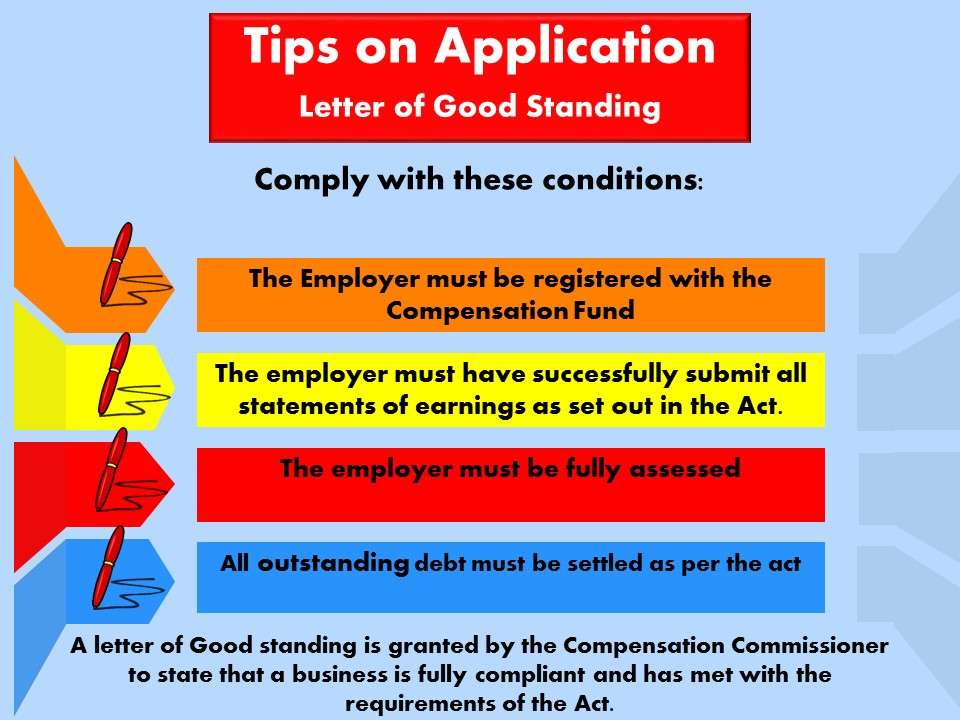Importance of a Letter of Good Standing
You can expect for our team to be professional, efficient and absolutely dedicated while we work hard to get your compensation fund letter of good standing prepared for you. If you would like to know more about the procedure, we recommend that you sign up now with The Return Of Earnings and Letter of Good Standing Package. Ensuring that your business is compliant is one of our main aims. In addition to this, we want to protect your employees against illness and injury. Waste no more time contact us via email or telephone to discuss your application for a letter of good standing and what it means for your business. This letter has become more and more important. Some businesses will not have you conduct any business on their premises if you do not have a Letter of Good Standing.MAKROSAFE have been assisting clients now for more than 23 years with their Letter of Good Standing.
Sign up now with The Return Of Earnings and Letter of Good Standing Package.

What is a Letter of Good Standing
The Compensation Fund has been set up to protect employees from the devastating effects of occupational diseases, injuries and even death. All employers are expected to register with WCA so that workers can claim compensation if they fall ill or suffer injuries at the workplace. All registered businesses who have even one employee are expected to pay annual assessment fees to be part of this particular fund. If you are not already registered, we can assist you with the process, starting with the first step: apply for a letter of good standing..jpg)
A letter of good standing is granted by the compensation commissioner to state that a business is fully compliant and has met with the requirements of the COIDA. In order to apply for this letter, you will need to comply with the following conditions of the Compensation for Occupational Injuries and Diseases Amendment Act, No 61 of 1997:
- The employer must be registered with the Compensation Fund.
- The employer must have successfully submitted all statements of earnings as set out in the COIDA.
- The employer must be fully assessed.
- All outstanding debt must be settled as per the COIDA.
How to get a Letter of Good Standing
An application is done online with the Department of Employment and Labour or manually. Be aware that only one online application can be made annually, so we can do this annually for you when you register with us to do this on your behalf. We will provide you with a legal document to sign that grants us particular authority for the handling of your letter of good standing. This is highly recommended if you want to ensure the best possible outcomes for your application our team of professionals is well versed in how the system and process works. We can use our thorough knowledge and expertise to ensure that the process is swift and hassle-free for you. Ensuring that you can have complete peace of mind is our main objective.For assistance with obtaining your Letter of Good Standing, click on the image below and follow the prompts:

MAKROSAFE / SAFETYWALLET / MY SAFETY SHOP are in Partnership.
What is the purpose of a Letter of Good Standing
The letter of good standing is to ensure authorisation of claims from employees against the Compensation Fund. The fund has been set up to protect employees from the negative impact of occupational illness, injury and death. To be part of this fund, your business must pay an annual assessment fee and have a valid letter of good standing.In order to receive this letter, you must register with the Compensation Fund and have submitted all earnings statements to the fund for perusal. You can expect for your business to be fully assessed and you will be requested to ensure that all outstanding debt, as per the COIDA, is settled before your letter can be provided. Once your letter has been granted, you can expect your company's certification to last for one year.
There are options to consider when applying for this letter. You can apply for one on a payment plan, where you can pay off the assessment fee over 2, 3 or 6 months. This is ideal for companies that do not have enough cash flow available or would prefer to pay monthly instalments over a lump sum. Those who wish to pay the assessment fee off must make an initial payment of 20% that is paid at the same time of application. All instalments must be completed at least 14 days before the expiry of your current letter. This assessment usually starts on the 1st of March every year.
More information from the Department of Employment and Labour about frequently asked questions:
Q - Under which circumstances can I obtain a Letter of Good Standing?
A - The employer can only obtain the letter if they comply with the requirements of the COIDA, including:
- Submitting the latest return of earnings.
- Assessment has been paid or instalments have been arranged.
- An application should be made in writing, preferably on a letterhead and at least one week prior.
- Quote the registration number, as well as a telephone and fax numbers with a dialling code.
- Applications on behalf of the employer by Consultants or Agents should be in writing and accompanied by a Power of Attorney.
- Tampering with the contents of these letters is a serious offence.
A - At the end of January each year, forms are sent to all the registered employers (W.as.8). These forms must be completed and returned not later than 31 March. The information on the form assists with the raising of assessment. CF-Filing website allows you to electronically file, pay and receive your Letter of Good Standing.
Q - When does the financial year end start or end?
A - The financial year of the Compensation Fund runs from the 1st of March to the end of February of the following year.
Q - What is regarded as earnings?
A - For the purpose of assessment, earnings mean before deductions any payments made to an employee which arise out of his employment and include:
- Overtime of a regular nature, (not intermittent or irregular overtime).
- Bonuses of any kind, including incentive bonuses and annual bonuses.
- Commission, even though the amount may vary from month to month.
- The cash value of food and quarters supplied to employees as part of a remuneration package. Cash value of fringe benefits such as a company car, free accommodation or accommodation at a reduced rate, etc.
- Travel and other allowances paid regularly, as part of the package.
- Where the employee is remunerated in accordance with a package of benefits, all items forming part of the package, other than employer contributions such as medical aid contributions.
- Earnings/Drawings paid to working Directors of a Company or Members of a Close Corporation. (To be declared separately) only if it is a fixed Salary.
- Excluded are the following:
- Payments of a reimbursive nature.
- Overtime worked occasionally.
- Payments for specific non-recurring tasks which do not form part of an employee's normal duties.
- Ex Gratia payments.
- Intangible fringe benefits such as subsistence and travelling costs, lunch and costs for business meetings.
- Travel and other allowances paid occasionally.
- If a director/member's remuneration is profit sharing, the Director/Member is not an employee in terms of the Act.
A - The assessment rate, at which an employer is assessed, depends on the nature of an employer's business operations. For rating purposes, employers are therefore divided into different classes and subclasses according to the nature of their activities. The assessment rates are fixed on the principle that each industry should carry the costs of its own accidents and are reviewed annually. Any adjustment is therefore in accordance with the accident experience.
Q - Assessment is not finalised and is referred for audit
A - Please provide the following documents to help us finalise the assessment:
- Affidavit (Reason for variance/ Credit assessment).
- Audited or Independently Reviewed Annual Financial Statement for the year under review.
- Detailed payroll report for assessment year under review.
- SARS EMP 501/Valid Tax Clearance if exempted.
- Manual return of earnings (W.As.8).
- Power of Attorney (consultants, bookkeepers and attorneys when representing the employer).
Q - What are the benefits (of registering with the CF) for the Employer?
A - The employer can benefit as follows:
- The COIDA makes provision for compensation to the employees for occupational injuries and diseases.
- The employer is protected against all civil claims which may be instituted against him in the event of an injury on duty, even in the event of alleged negligence.
A - If the accident record of an employer during a particular period is, in the opinion of the Director-General or FEM, more favourable than those of employers in comparable businesses, the Director-General or FEM may give such employer a rebate on any assessment paid or payable by him. Merit Rebates are paid each year at the discretion of FEM's board in accordance with the FEM's articles of association and are not guaranteed.
Q - Why does Compensation Fund impose penalties on employers?
A - This Fund is protected by provisions which permit the imposition of penalties on employers who fail to pay assessments, or render returns, at a rate of 10% of the assessment.
Click to download the Free COIDA Services Book.
Posted date: 27th Jun 2022
Latest News - Letters of Good Standing 

.jpg)
Comments (8)
I beg to apply for a letter of good standing. We be been doing this since 2019.
2021-07-05 21:40:10My company is new and i need letter of good standing and im applying for a tender
2023-02-09 17:56:07Dear Louis Thank you for your request via our comments... Kindly follow this link: https://www.mysafetyshop.co.za/Products/Letter-of-Good-Standing Add item to CART, open CART at top of page, PRINT QUOTE - When approved, return to your CART, complete the FORM and process...
2023-02-15 07:52:50Hi I need letter of good standing for my company
2022-08-08 14:40:16Hi If I work for a company as an atm installer and the risks is high for potential injuries, but the company letter of good standing stated that we make clothes, with no risks, so how am I get pay out if a safe fell on my hand and I lost a finger
2021-04-19 20:12:09Good day, I want to find out is a letter of good standing still valid for 21 days
2023-05-01 15:48:09Dear William Thank you for your enquiry via our comments... Your Letter of Good Standing will be valid for the period that you have paid in full, so if you paid for a year, then it will be valid for 12 months, however if you are on a payment plan with WCA, then it must be renewed for each term paid up... The expiry date will show on the Letter of Good Standing...
2023-05-02 07:54:33I working at raubex construction.. I don't have a letter of good standing. I did paid a compensation fun. So I don't have money for a letter of good standing yet but I will make a plan to pay that 750. So is it possible for me not getting my payment because of a letter of good standing?
2020-07-25 15:24:43Good day We need a letter of Good standing for our Company asap Department of labour busy with audit and need this immediately please Company name: LEKTRATEK (PTY) LTD P.O. BOX 6437 POTCHEFSTROOM 2531 L0024 account number
2023-08-22 10:19:47Dear Sonja Thank you for your request via our comments... I have called you and sent you an email...
2023-08-23 08:31:39Good day I need a letter of good standing for Qula Protection Services thank you
2022-04-19 15:47:51